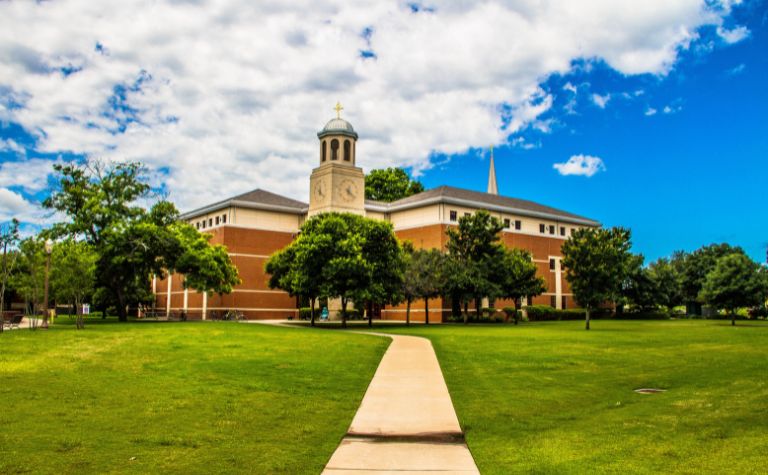Princeton Theological Seminary stands as one of the most prominent institutions in the realm of theological education.
Established in the early 19th century, it has consistently played a crucial role in shaping theological discourse, not only in the United States but also globally.
This article aims to provide readers with an overview of the core beliefs and values upheld by Princeton Theological Seminary.
By understanding its historical roots, theological principles, and commitment to engaging contemporary challenges, one can gain a clearer picture of the seminary’s place in the broader landscape of theological education.

Historical Foundations and Evolution
Princeton Theological Seminary was established in the early 19th century, making it one of the oldest seminaries in the United States.
Founded by the General Assembly of the Presbyterian Church, its primary mission was to train ministers to serve the growing congregations in the young American nation.
As the country evolved, so did the seminary, continually adapting to meet the changing needs of its students and the wider Christian community.
Throughout its history, Princeton has been home to numerous renowned theologians and scholars who have made significant contributions to Christian thought.
These figures have ensured that the seminary remained at the forefront of theological discussions, addressing pressing issues of their times while firmly rooted in traditional Christian teachings.
The seminary’s evolution is also reflected in its expanding curricular offerings and its increasingly global student body.
As the challenges faced by the Christian community have grown more complex, Princeton Theological Seminary has responded by broadening its academic horizons and deepening its commitment to serve the worldwide church.
In sum, the story of Princeton Theological Seminary is one of steadfast dedication to its foundational mission, while also displaying an impressive ability to adapt and grow in response to the changing world around it.

Core Theological Tenets
At the heart of Princeton Theological Seminary’s identity is its commitment to core theological tenets that shape the institution’s teachings, practices, and academic endeavors.
While the seminary values open dialogue and encourages a breadth of perspectives, certain foundational beliefs have remained consistent throughout its history.
One of the central tenets is the authority and trustworthiness of Scripture. Princeton upholds the Bible as a central source of divine revelation, guiding both personal faith and the broader teachings of the Christian church.
The seminary emphasizes rigorous biblical scholarship, ensuring that interpretations are both informed and respectful of the text’s historical and cultural context.
Another crucial belief is the significance of Jesus Christ as the savior and central figure in Christian theology.
Princeton affirms the traditional teachings regarding the life, death, and resurrection of Jesus, viewing Him as the unique and ultimate revelation of God’s love and grace to humanity.
Additionally, the seminary places a strong emphasis on the role of the Holy Spirit in the life of believers and the church.
This belief underscores the importance of personal transformation, spiritual growth, and the broader work of God in the world.
Lastly, Princeton champions the church’s role as a community of believers called to serve, worship, and bear witness to the gospel.
This communal aspect is vital, as it influences the seminary’s pedagogical approach and its broader vision for equipping leaders who will serve and unite Christian communities globally.
In essence, while Princeton Theological Seminary is open to various perspectives and interpretations, its core theological tenets offer a steady anchor, grounding the institution in a rich tradition while guiding its future directions.

Interdisciplinary Approach to Theology
Princeton Theological Seminary recognizes the importance of an interdisciplinary approach to theological studies.
Rooted in the belief that theology does not operate in isolation, the seminary promotes a holistic method that integrates insights from various academic disciplines.
One notable aspect of this approach is the interaction between theology and the humanities.
By drawing from fields such as philosophy, history, and literature, students can explore theological concepts through different lenses, enriching their understanding and fostering a more comprehensive grasp of the subject matter.
Similarly, the engagement between theology and the social sciences, including psychology, sociology, and anthropology, allows for a deeper exploration of the lived experiences of faith communities.
This interaction helps in understanding the dynamics of belief systems, rituals, and spiritual practices in various cultural and societal contexts.
The seminary also emphasizes the dialogue between theology and the natural sciences.
Students are encouraged to reflect on topics like creation, human identity, and the broader relationship between faith and the natural world by fostering conversations with disciplines like biology, physics, and environmental studies.
Moreover, by integrating the arts, including music, visual arts, and performance, Princeton offers avenues for students to express and explore theological concepts creatively and positively.
This artistic engagement enriches the academic environment and provides tools for effective ministry and community outreach.
Princeton Theological Seminary’s interdisciplinary approach ensures that theology remains relevant, dynamic, and deeply connected to the broader tapestry of human knowledge and experience.
This holistic method prepares students for effective ministry and leadership in an ever-evolving world.
Engagement with Modern Society
Princeton Theological Seminary places significant emphasis on engaging with modern society.
The institution recognizes that theology, while deeply rooted in tradition, must also be conversant with contemporary issues to remain relevant and impactful.
Central to this engagement is the seminary’s commitment to addressing societal challenges head-on.
From economic disparities and social injustices to technological advancements and changing family dynamics, Princeton seeks to equip its students with the tools and perspectives needed to navigate these complex landscapes.
Additionally, the rise of secularism and the shift in spiritual perspectives have led to a changing religious landscape.
Princeton responds to these shifts by fostering dialogues about the role of theology in a society where traditional beliefs might be questioned or reinterpreted.
This encourages students to think critically about their own beliefs and understand the beliefs of others.
Environmental concerns, another pressing issue of our times, also find resonance in the seminary’s curriculum.
Exploring the theological implications of environmental stewardship and the ethical dimensions of human interaction with nature ensures that students are prepared to lead communities in sustainable and eco-friendly ways.
Furthermore, the seminary acknowledges the impact of digital media and communication technologies on spreading theological ideas.
By integrating technology into the learning process and understanding its potential in reaching larger audiences, Princeton ensures that its graduates are adept at using modern tools for ministry and outreach.
In essence, Princeton Theological Seminary’s proactive approach to engaging with modern society ensures that its graduates are well-versed in theological concepts and prepared to apply them in real-world contexts, making a positive difference in the world.
Global Perspective and Ecumenical Commitment
Princeton Theological Seminary, since its inception, has been influenced by and has influenced the global theological landscape.
Recognizing that theology is not confined to one culture or region, the seminary has consistently striven to ensure a global perspective informs its teachings.
A key element of this approach is Princeton’s commitment to ecumenism.
The seminary encourages its students to understand, respect, and engage with theological traditions other than their own.
This open-minded approach ensures that students are equipped to foster unity among Christians of different traditions and to appreciate the rich tapestry of global Christianity.
Collaborative initiatives with theological institutions around the world have also been a hallmark of Princeton’s approach.
Princeton has woven itself into the fabric of global theological education through exchange programs, joint research projects, and shared resources.
Such collaborations not only enrich the academic experience of students at Princeton but also contribute to a richer, more nuanced understanding of theology on a global scale.
Furthermore, the seminary’s curriculum incorporates study of global Christian movements, the history of Christianity in various parts of the world, and the challenges and opportunities these present.
This ensures that students are aware of global theological trends and equipped to participate in and shape these discussions.
In sum, Princeton Theological Seminary’s commitment to a global perspective and ecumenism stands as a testament to its understanding that theology is a universal discourse that thrives when informed by multiple voices and traditions from around the world.
Recent Posts
David Jeremiah, a renowned pastor, author, and speaker, has captivated the hearts of many with his compelling sermons. His messages resonate deeply with diverse audiences, leaving an enduring...
Tim Keller, a distinguished pastor, theologian, and author, has garnered a devoted following through the profound impact of his sermons. In this article, we will explore seven compelling reasons...
